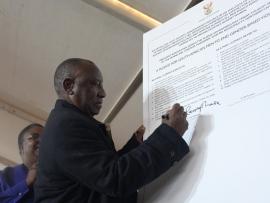
South Africa is deeply traumatised by the violence perpetrated against women and children, says President Cyril Ramaphosa.
“As we celebrate the gains made during the 30 years of freedom and democracy, our country is deeply traumatised by violence against women and children. This violence is a betrayal of our Constitution. It is an affront to our common humanity,” the President said on Friday.
In his address to the National Women’s Day commemoration held in Pofadder in the Northern Cape, the President said the fight against gender-based violence and femicide (GBVF) continues.
“Guided by our National Strategic Plan, we have introduced new laws that protect survivors of gender-based violence, improve the response of the police, and ensure harsher sentences for perpetrators.”
He told those gathered at the Dennis Nel stadium that government has opened up additional Sexual Offences Courts, while the network of Thuthuzela Care Centres has been expanded.
“We have introduced more victim-friendly services at police stations across the country. We have just recently passed legislation for the establishment of a Gender-Based Violence and Femicide Council to mobilise and coordinate work across society.”
President Ramaphosa, joined by Northern Cape Premier Dr Zamani Saul and other government officials, signed a pledge for South African men to end gender-based violence and femicide during the national Women’s Day commemoration at the Denis Nel Stadium in Pofadder.
HSRC survey
The first citizen also referred to the Human Sciences Research Council’s first-ever national survey on gender-based violence prevalence in a democratic South Africa, saying that the survey results will help guide the response to GBVF.
The study was undertaken in 2022 based on a random sample of people interviewed at home.
It measured issues like physical, sexual, emotional and economic abuse, as well as controlling behaviour between intimate partners. The detailed results of the survey will be released in the coming weeks.
Among other things, the survey found that around 7% of women aged 18 years and older had experienced physical or sexual violence in the past 12 months. This rate was highest among young women, black women, women who completed secondary education, and women who are unmarried but live with a partner.
“Seven percent may not sound like a lot but this figure is the equivalent of 1.5 million women. So, according to the HSRC survey, over the course of just one year, more than one and a half million women experienced physical or sexual violence in our country. That is more than the entire population of the Northern Cape.
“These are not statistics. These are human beings. These are women who have endured trauma that no person should have to experience.”
The President said the survey highlights that physical violence starts early, often affecting adolescent girls and young women, and that it continues through adulthood.
“Around 13% of women who had ever been in an intimate relationship reported that they had experienced economic abuse at the hands of their partner. This is why we need to address the massive inequality in income between men and women.”
He stressed that on average, women earn a quarter of their income from grants, compared to a far lower percentage for men.
“We must therefore create more jobs and other economic opportunities for women, so they are less vulnerable to exploitation and abuse.”
Changing behaviour
The survey also showed that 4% of men reported having perpetrated physical violence against a woman in the preceding 12 months.
“This translates to over 600 000 men. This makes clear what we all know. Men must change their behaviour. Men must change their attitudes. That is why we today we call on all South African men to make a pledge to be part of the solution. To take responsibility for their actions.”
He called on men not to raise their hands against women, while also urging them to treat women as equals and with dignity.
“If we are to end gender-based violence, we must work together as a society. We must work together, both men and women, both young and old,” he said.
This year’s Women’s Day marks 68 years to the day since 20 000 women of diverse backgrounds marched to the Union Buildings to protest the pass laws of the apartheid regime. - SAnews.gov.za


